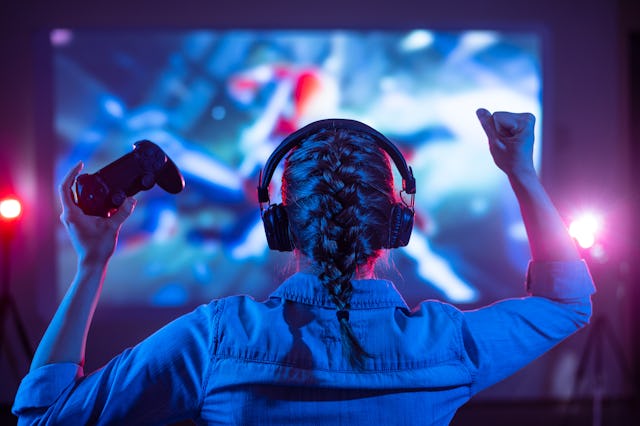Video Games May Not Be As Bad For Kids' Intelligence As You Think
A study showed that playing video games was associated with greater gains in intelligence in kids ages 9-12.

Unless you’re parenting in a rustic cabin miles from the nearest WiFi (and if so, how are you reading this?) your children have daily exposure to screens. If you’re like most parents, you worry about the impact of all those hours. As researchers study the effects of an increasingly digital world, it’s becoming clear that not all screen time is created alike, and not all of it is detrimental to kids’ brains.
For example: a new study shows that playing video games may a positive impact on kids’ intelligence. Using information collected from over 5,000 children at ages 9-10 and again two years later, researchers found that kids who played more video games at ages 9-10 showed the most gains in intelligence two years later. This effect was similar in both boys and girls.
While this is not the first study to show a positive cognitive impact of gaming in kids, it is unique in that it took into account both genetics and socioeconomic status (such as parents’ income and education levels), which we know impact intelligence.
The study also used five tasks to assess intelligence, measuring reading comprehension and vocabulary, attention and executive function, visual-spatial processing, and “learning ability over multiple trials.” Kids reported how much time per day they spent online doing three different types of activities: watching videos (online or on TV), socializing, and playing video games.
As we’re all well aware, kids spend a lot of time in front of screens. The data analyzed by researchers for this study showed that kids were at screens for an average of 4 hours every day, with kids in the top 25% of users clocking an average of 6 hours a day. Kids spent about 2 and a half hours watching videos online or on TV, half an hour socializing online, and one hour playing video games.
At ages 9-10, researchers found a correlation between lower intelligence scores and a watching videos/TV or socializing line. Gaming seemed to have a neutral impact at this age. However, two years later, gaming seemed to have a positive impact on intelligence. The kids who had spent more time playing video games at ages 9-10 showed the most gains in intelligence when measured two years later.
Socializing online did not show this kind of impact. Watching videos did appear to have a positive impact, but less so when parental education was taken into account.
In terms of gender, it’s no surprise to hear that boys in the study tended to spend more time gaming and watching videos, while girls spent more time socializing. Interestingly, girls ages 9-10 who spent more time playing video games tended to also have higher intelligence.
Does all of this mean that you should start encouraging your kids to spend more time playing video games? Not exactly. Any screen time can be bad for kids’ physical and emotional health if it takes away from time that they might spend moving their bodies, exploring the world, or interacting with others. However, this study offers further proof that not all screen time is created equal — and that video games may be one of the more positive ways for kids to engage digitally.
Limitations of the study included having participants self-report their screen time, and a lack of differentiation between types of video games — it’s not clear which kids were playing puzzle games and which were playing first-person shooters.
“Our results should not be taken as a blanket recommendation for all parents to allow limitless gaming,” researchers Torkel Klingberg and Bruno Sauce wrote. “But for those parents bothered by their children playing video games, you can now feel better knowing that it’s probably making them a tad smarter.”